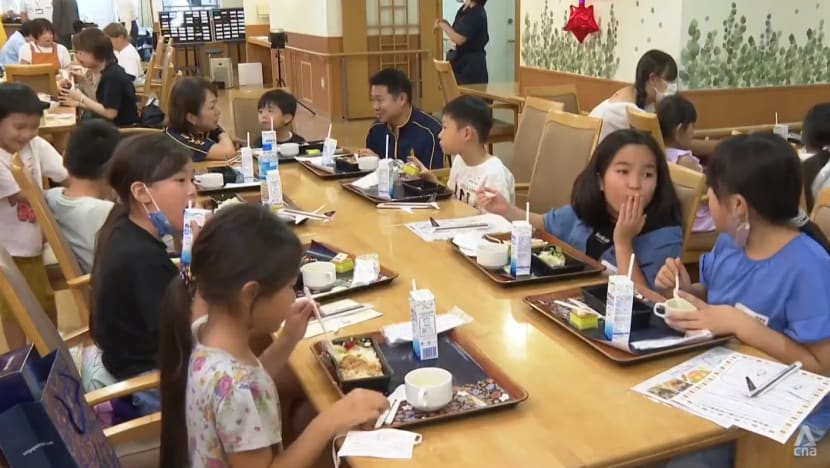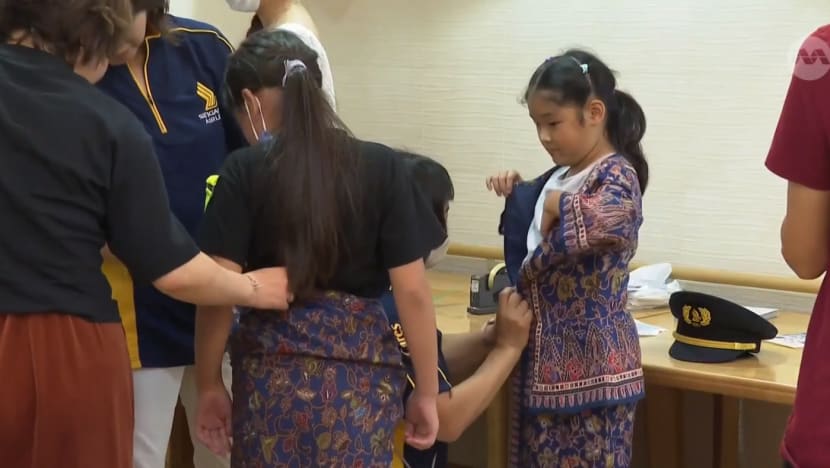Children in Japan bring cheer to nursing homes by popping by for meals once a month
Among the meals the residents and guests have enjoyed is chicken rice sponsored by Singapore Airlines.

Children at a Sompo Care nursing home in Japan, where the meals were provided by Singapore Airlines.
TOKYO: On most days, elderly living at a care facility housed in a Tokyo condominium eat their three meals a day with one another.
But once a month, the seniors, many of whom live independently with minimal assistance at the home managed by Sompo Care, look forward to lunchtime visits from unlikely companions – children from the neighbourhood.
These lunches at the nursing home are organised as part of the children’s cafeteria concept, or kodomo shokudo, which was introduced to help with Japan’s child poverty rate.
According to Paris-based think tank Organisation for Economic Cooperation and Development (OECD), the rate of child poverty in 2017 was at about 16.3 per cent – one in every six children – making it one of the highest across industrialised countries.
Kodomo shokudo is a grassroots initiative typically operated by volunteers that provides free or low-cost meals to children. The gatherings are held at places like community centres, shops and temples.
The programmes differ from one kodomo shokudo to the next, with some offering children a place to study or play on top of the meals.
For Sompo Care, it sees bringing the young and the old together as a win-win solution for both generations – the residents have the pleasure of hosting guests, while the children are given the opportunity to meet those the age of their grandparents.
So far over 10,000 children have been invited to kodomo shokudo events hosted by the firm at their elderly homes nationwide.
CHICKEN RICE ON THE MENU
When CNA visited a kodomo shokudo event at one of the company's elderly homes on Sep 22, the menu did not have the usual local fare. Instead, residents and guests were served Hainanese chicken rice and pandan cake – popular food from the city-state of Singapore.
The meals were provided by Singapore Airlines (SIA), the first major company the home has worked with for the children's cafetaria project.
Although the initiative mainly caters to children from poorer homes, the organiser extended the lunch invitation to those from all backgrounds, as well as their parents.
“It’s my first time having chicken rice. I had a bite. It’s so good. I want to have some more,” one mother said.
Aside from the food, the airline also brought in volunteers to spend time with the children and elderly, sharing with them about life in Singapore and their jobs. Among the activities for the young ones was trying on the airline’s uniform.

“We saw happy faces not just on the kids but on their parents, as well. It says a lot. We do find doing this very meaningful and can continue for many years,” said SIA’s general manager for Japan, Mr Kenny Teo.
BRINGING NEW ENERGY
Since last November, Sompo Care has been offering activities beyond just serving meals in its 440 care facilities.
The firm’s senior leader Emi Sakurai said the COVID-19 pandemic, which saw visitations banned or greatly reduced in nursing homes, caused loneliness to seep in and many residents fell ill as a result.
“The children had little chance to be with their grandparents and our residents had limited access to mingle with the local community,” she said.
“By coming into contact with others, they (residents) have started to smile and some have tried to get up from their wheelchairs.”
Japan is ageing fast with more than 10 per cent of its people 80 years or older, according to latest figures. The country also has one of the world’s lowest birth rates, and children increasingly grow up in small families.
The initiative has had other bonus effects on caregivers and kitchen staff, with former employees offering to return to work as their jobs are now more fun, the company said. This comes as a bright spot in the nursing home industry, which has been suffering from a labour shortage.
















